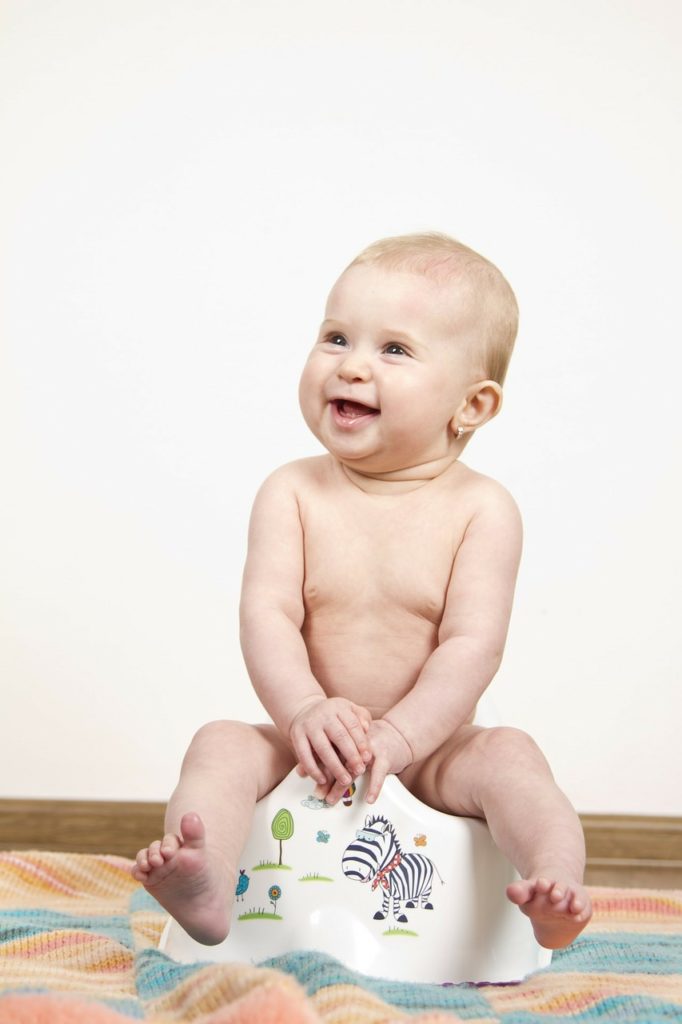Is There a Difference Between Potty Training Boys vs. Potty Training Girls?
“Lexi is already pooping and peeing on the potty and she won’t even be one until next month,” Crystal tells the other moms at their weekly playdate.
“Well, I’ve heard potty training girls is easier than potty training boys” Valerie pipes in.
“You know it’s better to wait until they are at least two to potty train or else they will get overwhelmed and regress and you’ll have to start the process all over again. That’s why I think my three-year-old is just waiting for the perfect time to start and then she won’t have to relearn it again” Heather responds, condescendingly.
“Well I don’t know which is easier, potty training girls or potty training boys, but I do know I am putting Noah on the potty every hour to get him used to the idea of going potty and he’ll start to go any day now” Jackie, another parent in the group, responds.
“Jack has been going to potty since he was two, but I still need to wipe for him. I don’t want to rush things and make him feel overwhelmed,” chimes Meg.
“You know, they say to let children decide when they are ready, so I haven’t pushed the issue,” explains Nancy, another mom from the group.
Potty training is a hot topic. There is hardly a parent that doesn’t experience some kind of potty training problem.
Potty training often involves taking a natural process and unnecessarily complicating it, causing a lot of frustration for parents and children.
There is no research that conclusively proves any one particular potty training method consistently and reliably works with all children in a guaranteed specific amount of time. (You’ve probably read those “potty training in a day” books and know they don’t work for a lot of parents. In fact, sometimes the tactics backfire.) There is also no research that proves potty training girls is easier than potty training boys or vice-versa.
Unless you are toilet training a child with autism or a developmental disability, you can look at child development, basic psychology and family dynamics and see clear patterns emerge. By knowing the following insights, you can make an informed decision about how you want to handle potty training.
First, Do You Realize That Going Potty Actually Takes 12Steps And At Least 17 Tasks?
- Realize you have to go. (1 task) This is the hardest step for young children.
- Turn on the bathroom light. (1 task)
- Get to the potty in time. (1 task)
- Undo buttons and zippers and pull pants and underwear down in time (up to 4 tasks)
- Lift the seat or get onto the potty without falling in (1 task)
- Aim accurately or be sure everything that comes out goes in the potty (1 task)
- Reach the toilet paper without losing your balance or falling off (1 task)
- Wipe all the residue off and drop the paper in the toilet (1 task)
- Get off the potty, pull up your pants and underwear, and redo buttons and zippers (up to 5 tasks)
- Flush the toilet and maybe close the lid or put the seat down (up to 2 tasks)
- Wash hands with soap and water (1 task)
- Turn off the bathroom light. (1 task)
Is it any wonder toddlers can’t master the process in a day or even three?
Children really aren’t “potty-trained” until they do all the steps and tasks independently. How the child learns the process is controversial because no one approach offers consistent results. There are, however, two key factors that influence how fast and successful potty training will occur: the parent’s approach and the child’s reaction to that approach.
There Are A Broad Range Of Potty Training Approaches:
- At one extreme, parents may be totally unconcerned with potty training and assume children will eventually learn to go on their own, with little or no parental effort. You would think this approach takes the longest, but it doesn’t. Some children learn simply by watching others; most don’t.
- Another approach is to teach the child in a relaxed unhurried way. You patiently teach the child the different tasks and steps, provide role models for the child, have realistic expectations, and handle the entire process in a very matter-of-fact, calm manner. As the child progresses, the parent expresses confidence in the child’s ability, verbally acknowledging the child’s efforts, and focusing on independence and hygiene as the rewards for accomplishing the task. This approach is the most effective and physically and emotionally healthy. It just seems to take the longest, because parents are paying attention to the process and can become impatient if the child takes longer to learn than they would prefer.
- A more controlling approach involves parents watching, reminding, bribing, and rewarding the child with stickers and candy. While this approach can get fast results, it carries a high risk of initiating power struggles, which can lead to bigger problems.*
- The most extreme controlling approach is for parents to do all the thinking and work for the child, from birth. These parents devote themselves to watching the child for cues that they need to go and then dropping whatever they are doing to rush the child to a location where they can relieve themselves. A 2011 Good Morning America ABC report quoted several parents who use the “elimination communication” approach where even young babies are watched for signs they are eliminating and are then held over a potty. A New York Times report highlighted stories of a mom who carried a bowl to a party and took her child to the corner of the room to pee into it and another held her baby over a sink in a public bathroom! This approach doesn’t actually train the child and it violates several universal effective-parenting principles. But if you do choose to use it at least put the baby on a toilet!
While all of these methods can “work,” none can guarantee immediate results, because each child is different. For example:
- Children differ in their readiness and ability to understand and perform the steps and tasks.
- Children’s personalities influence whether they want to please their parents or be independent, feel encouraged or manipulated, will blindly obey or rebel against control.
- Some children relax and go with the flow while other children hold out and hold on, literally, even if they develop medical problems in the process.*
Furthermore, it is practically impossible for any child to be completely potty trained (totally independent and self-responsible) before 18 months old and unlikely before the age of two-and-a-half. Here’s why:
- Children cannot control the sphincter muscle (responsible for holding/releasing bowel movements) until they are at least eighteen-months-old. The muscle doesn’t have that ability until that age. So anything that happens before that age is because the parent is trained, not the child.
- Remember those 12 steps and 17 tasks? Well #7 is wiping oneself, which isn’t even physiologically possibly until a child’s arm has grown long enough to reach his or her behind! Most children who are on-track developmentally will be able to do this task independently by kindergarten. So that means that no matter what method you use, your child still won’t be able to perform this final step of potty training independently until about the same age as every other child.
The choice is yours. How much time, attention, effort, and emotion do you want to invest in this? Unlike most “returns on investments” (ROIs), the more you invest in this process — by making it a “big deal” — the more it actually increases your risk of experiencing problems. Since every child will eventually do this naturally, your choice is whether to teach skills in a relaxed way and give encouragement or try to control the child.
Children consistently prove to us that ultimately their bodies are within their control. We can lead them to a potty but we really can’t make them go. Anytime potty training has become a big issue, you will usually find one of two things: Either the child had a bad experience and is fearful of going potty or the child felt the parent was too controlling and they are now in a battle of wills. Both can cause children to hold onto their waste to the point of developing a chronic medical condition! These problems take the longest to resolve and may require medical assistance. It’s not uncommon for these children to still not be fully potty trained by kindergarten.
It really boils down to this: It makes no difference whether you are potty training girls or potty training boys nor what techniques, tactics and tricks you try, your child’s intellectual, psychological and emotional makeup will determine the speed and success of potty training. There are no fully functioning adults who aren’t potty trained, so eventually everyone learns this skill. In fact, unless a child has a medical condition or bad potty-training experience, all children will potty train themselves during the early child development stages before they start kindergarten.
So don’t feel inferior when some mother compares her so-called potty-trained baby to your training-in-progress toddler. Just smile, knowing both children will complete the learning process about the same time no matter what the parent does…and some methods are healthier and riskier than others.
For additional tips on potty training and teaching children to become independent learn more about The Parent’s Toolshop® and its unique Universal Blueprint® problem-solving system, read the 7 Keys to Parenting Success free ebook. You’ll be less frustrated, respond more calmly, and feel more confident in any parenting situation.
*********************************************************************
Jody Johnston Pawel, LSW, CFLE is President of Parent’s Toolshop® Consulting, where she oversees an international network of Toolshop® trainers. For 30+ years, Jody has trained tens of thousands of parents and family professionals worldwide through her dynamic workshops and hundreds of interviews with the media worldwide, including Parents and Working Mother magazines. She is the author of the award-winning book, The Parent’s Toolshop®, and countless multimedia resources that support and educate parents from diverse backgrounds, plus other adults who live or work with children. You can find them at her award-winning website, www.ParentsToolshop.com.
Reprint Guidelines: You may publish/reprint any article from our site for non-commercial purposes in your ezine, website, blog, forum, RSS feed, or print publication, as long as it is the entire unedited article and title and includes the article’s source credit, including the author’s bio and active links as they appear with the article. We also appreciate a quick note/e-mail telling us where you are reprinting the article. To request permission from the author to publish this article in print or for commercial purposes, please complete and send us a Permission to Reprint Form.




1 thought on “Potty Trained or Parent Trained?”
Thanks for sharing!